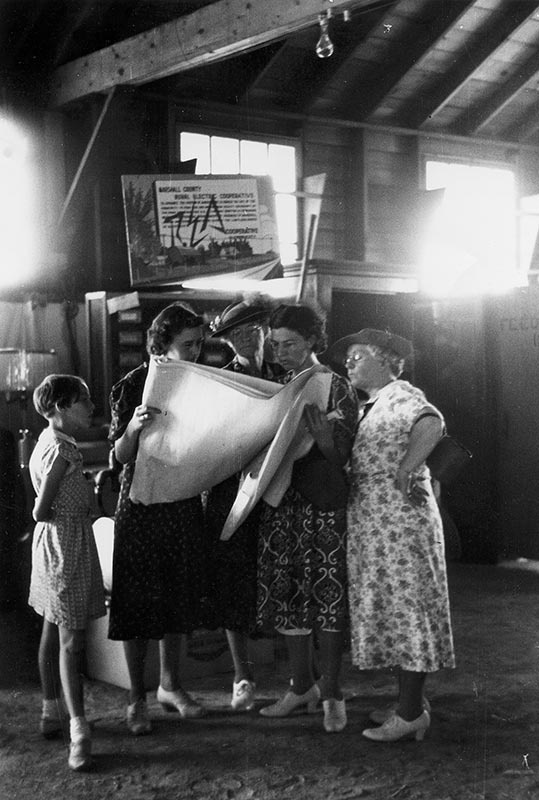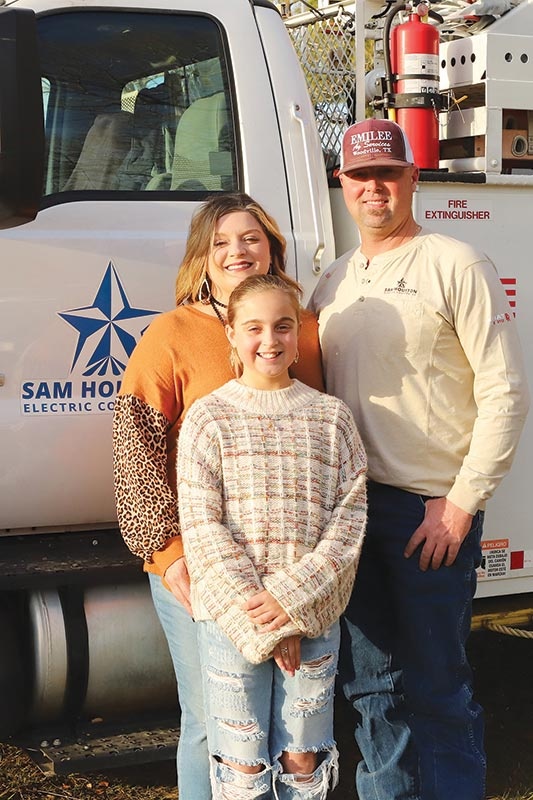For more than 80 years, Sam Houston Electric Cooperative has thrived thanks in no small part to the women of East Texas.
Ruth Clarke, for example, was one of the first two employees at the Co-op, and Besse Mae Clarke Stanford, Mrs. C.S. Wainwright and Mrs. J.I. Oliver were three of the original board members. These four ladies were instrumental in guiding the fledgling Cooperative in the Piney Woods at its inception in 1939 and likely never dreamed it would be one of the leading electric cooperatives in the nation 80 years later.
This Women’s History Month, Sam Houston EC celebrates all of the women who have shaped the Cooperative—those employed by the Cooperative as well as all those who support the Cooperative’s mission to serve.
Nine-year-old Charles Lewis Stanford sat ready in the front seat of his family’s shiny, black 1937 Chevrolet, next to his mother, Besse Mae Clarke Stanford, at the wheel. A lot was riding on their mission. The youngster’s job was simple, he told Randy Mallory for the May 2014 issue of Texas Co-op Power: Hop out of the car at each farm and open the barbed wire gate to let the vehicle through.
His mother’s job was tougher: Convince as many farm families as possible to sign up for electric service from a cooperative not yet up and running. The idea of bringing power to the countryside was not universally accepted. Some folks were used to their self-sufficient way of life and didn’t want outside interference, even if it brought the promise of a brighter day. Some were scared of electricity—afraid it might burn down their houses or trees.
A more practical obstacle was the $5 membership fee, a sizable sum for cash-strapped families during the Depression. But many families living between Livingston and Onalaska knew and respected Besse Mae Clarke Stanford as a teacher, and that reputation helped her convince many to sign up. Still she sometimes received penny postcards from recently enlisted members saying they had changed their minds and wanted their $5 back. “We’d have to drive back out, and Mother would try all over again to convince them to have faith in the Co-op,” Charles Lewis Stanford said.
He also recalled riding his horse to watch crews set the first poles and stretch the first electric lines across his family’s farm, which got Co-op meter No. 13. It reminded him of putting up a barbed wire fence. For Besse Mae, seeing electric lines reach her farm and those of her neighbors was gratifying. By then she had become a founding director and officer of the Co-op.
To this day Sam Houston EC members continue to elect women to the board of directors, with Katherine Hardin representing Hardin and Liberty counties and Casey Evans Davis representing Angelina, Polk and Trinity counties.
The 10th-largest electric co-op in Texas, Sam Houston EC employs strong women leaders within its ranks as well.
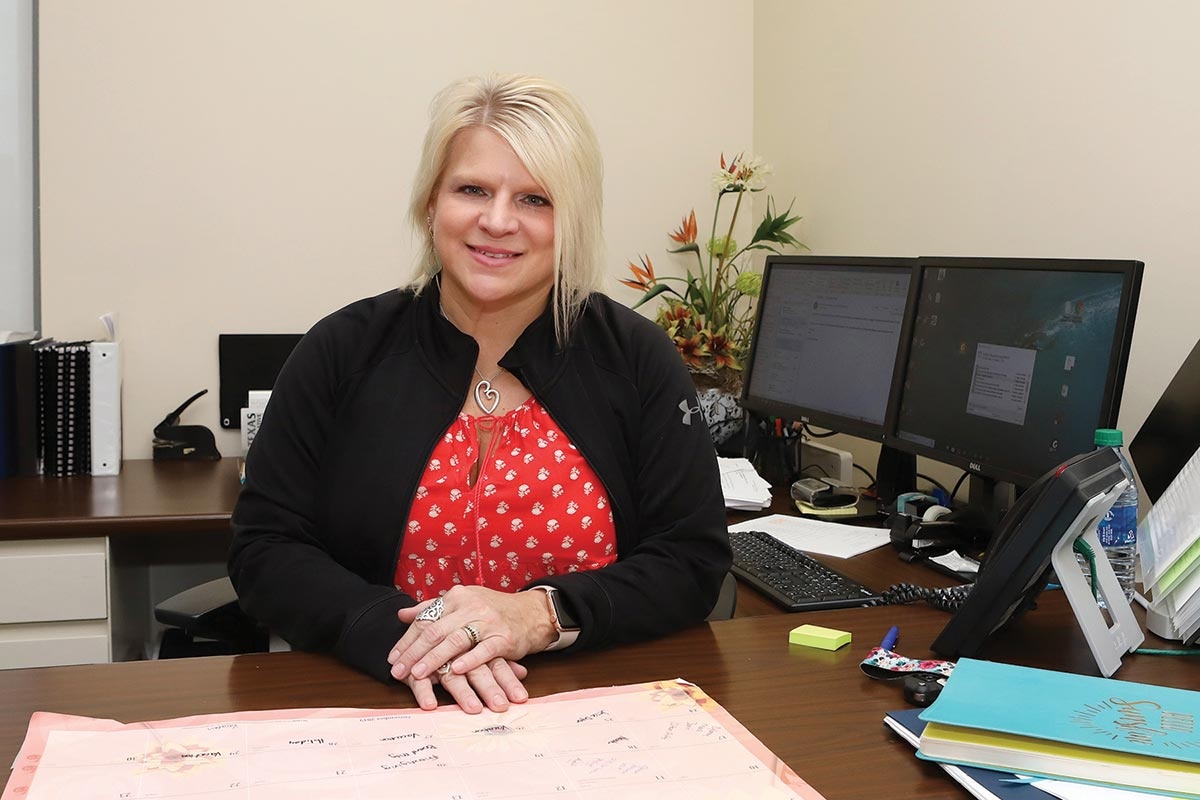
Dana Massey, director of administration, oversees all administrative policies and procedures at Sam Houston EC, the 10th-largest electric cooperative in Texas.
Dana Massey started at Sam Houston EC as a member services representative. She held several positions at the Co-op before being named the director of administration in 2019. In this position Massey oversees all aspects of the Cooperative’s employment, recruiting, benefits administration and training functions for 160 employees. She develops, implements and coordinates policies and procedures; conducts surveys to ensure the Cooperative offers competitive wages; confirms performance evaluations are conducted; and assists the board of directors.
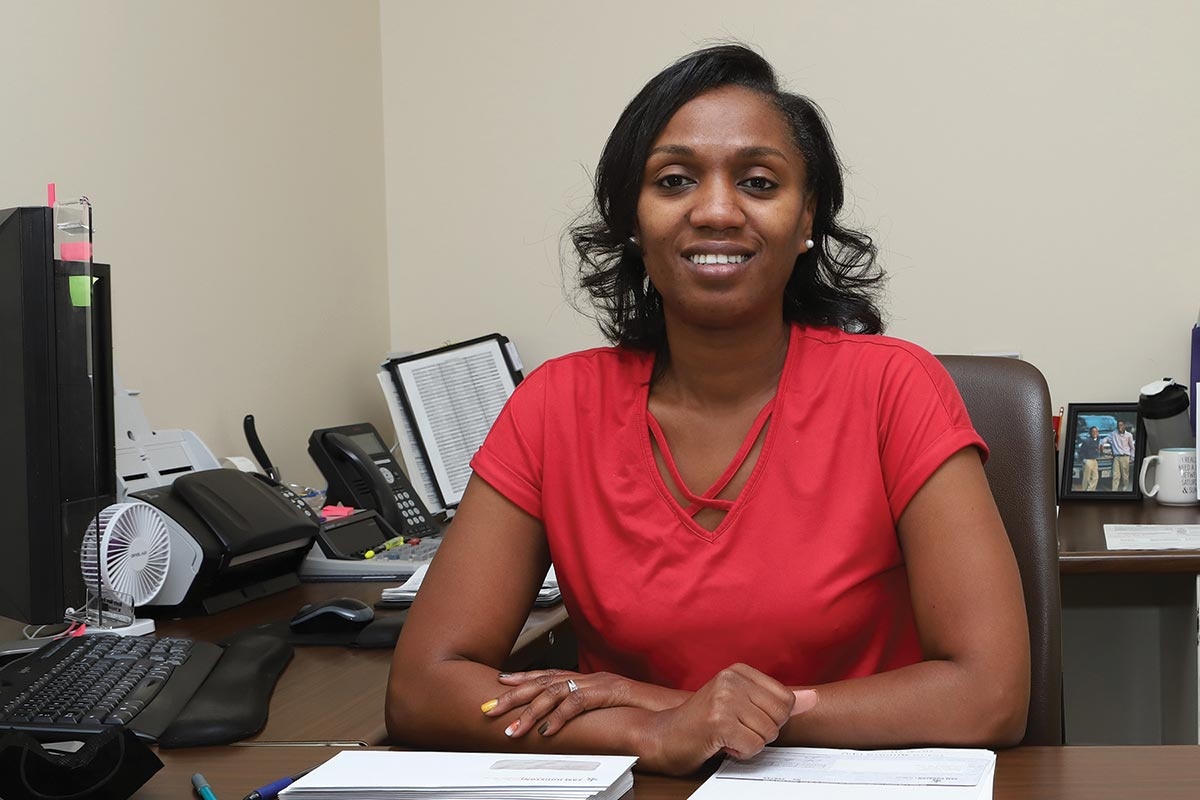
Sonya Reece, an accountant, has worked at Sam Houston EC for 15 years. She recently earned a master’s degree.
Sonya Reece is an accountant at the Co-op. Recently she earned a master’s in business administration at the encouragement of Molly Gray, former manager of accounting who retired from the Co-op several years ago.
“Molly shared with me her journey to become a CPA and how hard it was,” Reece said. “She told me she could have given up, but she stayed the course. That lesson stuck with me. It’s not about how you start; it’s how you finish. I respected her for pushing me to be and do better. The fact that she genuinely cared, and even after her retirement she would check in to make sure I was still working toward completing my goals.”
Another core group of women who form part of the co-op family are the wives of our line technicians—affectionately known as “line wives.” Sam Houston EC’s 50 line technicians are the backbone of the Cooperative. They work to maintain a reliable and safe distribution system on a daily basis. Often they are called on during the night to respond to power outages during and after storms and unexpected events.
Many of these technicians are forced to leave family events or evening meals to restore a consumer-member’s power. When they leave home, their wives can’t help but worry about their husbands and their co-workers. But they claim their title of line wife proudly, often listing it on their social media accounts and printing it on clothing or bumper stickers.
“I am very proud of him because I know how hard he works and the long hours that he works,” Misty Campbell said of her husband, line technician Randy Campbell. “I am very thankful that he enjoys what he does and he works like that for us.”
Randy Campbell has worked for the Co-op for 35 years, and the Campbells have been married for 25 years. Their sons Cade and Case have worked or still work as line technicians in the area. Sam Houston EC has a nepotism policy preventing close family members from being employed by the Co-op, so Randy Campbell is not able to actually work with either of his sons.
Each branch office requires line technicians to be on call to respond to outages outside of normal work hours, and all line technicians may be called in for restoration efforts following large storms.
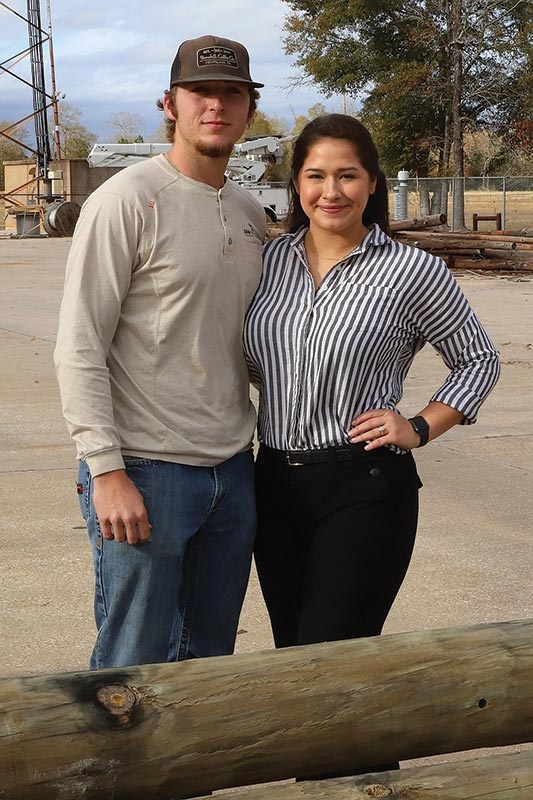
Dalton and Jasmine Hodge at the Coldspring branch office, where Dalton works as a line technician. The couple has been married for less than a year, but Jasmine is adjusting to life as the spouse of a Sam Houston EC line technician.
“He does seem to get called out whenever we are doing something with family or friends, or we are at an event,” Jasmine Hodge said of her husband, Dalton Hodge. “Everything we do is within the range [for Dalton to respond to a call]. It never fails; he will get a call. Both Thanksgivings [we have been together] when we sat down to eat, his phone rang. Making plans with family and then him getting called out right when we get there—that is the hardest part.”
The Hodges have been married for just a few months. Due to the pandemic, Jasmine Hodge has not been able to meet many other line technicians’ wives, who sometimes act as an informal support group among those who understand the demands of this career.
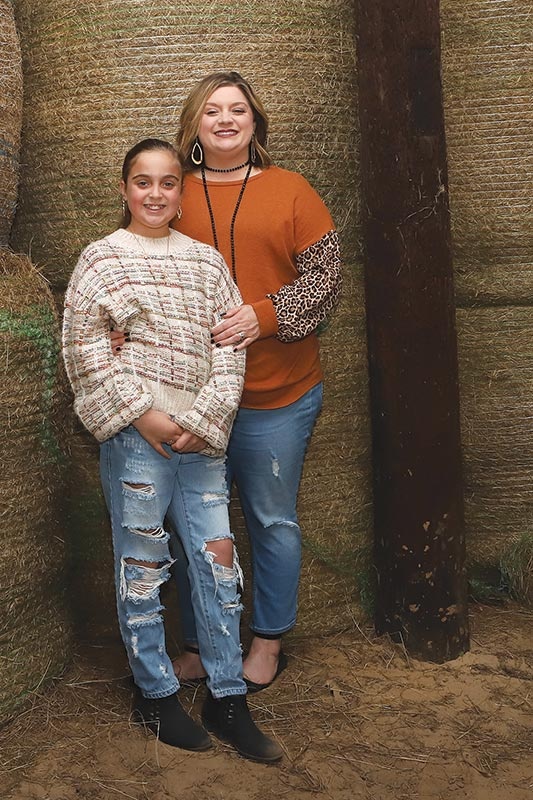
Tracy Johnston and her daughter Adelyn take care of business on the Johnston ranch when Tracy’s husband, Jeff, is called out to restore power around Woodville.
Tracy Johnston, wife of Jeff Johnston, has strong bonds with several line technicians’ wives in their area, near Woodville.
“I am very close with several wives at the Woodville branch,” Tracy Johnston said. “With the exception of this year, we usually get together for a Christmas gift exchange at a local restaurant, husbands too. Several of us have children the same age. We usually gang up at ball practices, games and local stores.”
While the wives may get support from their friends and family, each woman must at times endure many family, home and farm responsibilities on their own.
Tracy Johnston can handle most tasks on her family’s ranch, except driving the tractor, according to her husband. Misty Campbell also accepted that she would have to be the one to take care of her sons if they got sick at school, and she has never missed one of their games.
“She is strong-willed, and she is an independent woman, so she does not just rely on me if I am away from the house,” Dalton Hodge said of his wife, who is also a specialist in the Army National Guard.
These wives understand their husbands love their jobs. It also helps that the pay is nice and that the Co-op takes care of its employees with good benefits and retirement plans. Still, line technicians’ wives can miss their husbands and miss their support at home.
“Randy loves to travel,” Misty Campbell said. “He went to Louisiana after Hurricane Laura last year to help [Beauregard Electric Cooperative]. Even though we do not have children at home anymore, after a few days I am ready for him to be back home. I know he is helping people, so you just learn to cope with it.”
Tracy Johnston, despite her close-knit family and friends, remembers wanting her husband to be home to help take care of their house after Hurricane Laura.
Jeff Johnston was out helping people and restoring power for a few days after the hurricane, but their home had a leak in the roof caused from the storm. Tracy called Jeff, and he said he would put a tarp on the roof when he got home that night. He got home after nightfall and was finally able to cover the leak after a long day of helping restore power to more than 7,000 consumer-members in Tyler, Hardin and Angelina counties.
“People always assume we get our power back first after a storm and that we get a discount on our bill,” Misty Campbell said. “That is not how it works. We sit at home without power, too.”
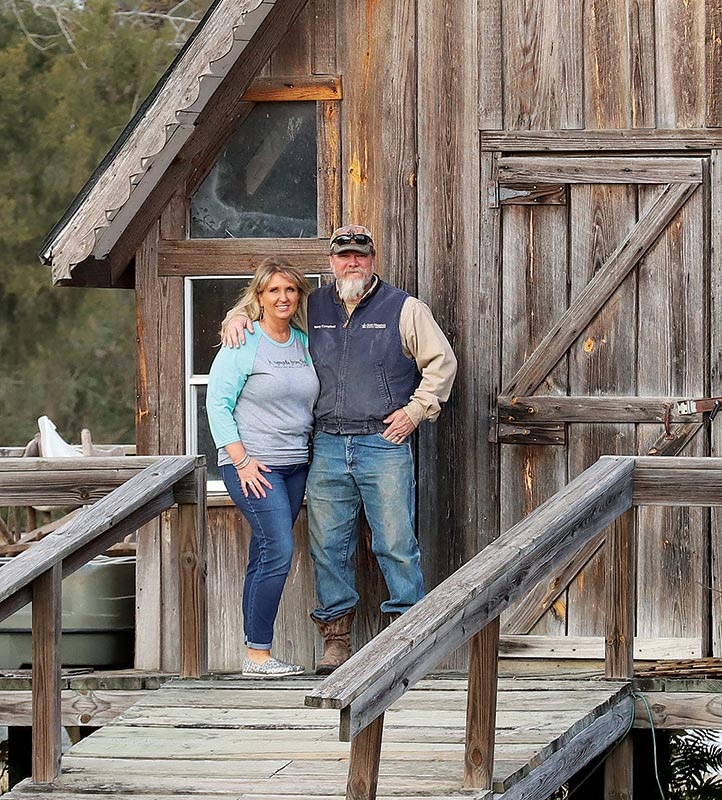
Randy and Misty Campbell stand in front of a small cabin on their picturesque property near Livingston. They have been married for 25 of Randy’s 35 years as a line technician at Sam Houston EC.
Misty Campbell and Tracy Johnston entered their marriages not knowing much about the Co-op or the power distribution system, but they have learned some of the lingo over the years. Jasmine Hodge is still learning.
“I come home and tell her about my day and she just nods,” Dalton Hodge said, with Jasmine adding, “I pick up some of the words. I know what a transformer is, but he does quiz me. One time he asked me which line was a neutral. I guessed and I got it right. I have learned about the safety part of their job, and that is the most important to me.”
All of these Co-op wives advise any woman thinking about marrying a line technician to be prepared for the long and inconsistent hours, to realize their husbands provide a vital service and to be prepared to learn what a line technician does.
“When we were younger, I really didn’t know what he did,” Misty Campbell said. “So many people think he is an electrician, but after 25 years I have a pretty good idea what he does now. You just have to learn to roll with it, and if you are an anxious person, then you might have trouble. I pray and get through it that way.”
“I would tell them to just be prepared for [their husband] to get called out at any time,” Jasmine Hodge said. “Hunting season is not going to happen. He will look at every power line driving down the road, and he will say something about it. He will check the weather every day. I never really cared if it was going to be rainy or windy out, but he checks the weather every day.”
The life of a line technician’s wife is full of interruptions and filled with a lot of prayer, but she endures those times knowing the importance of the service her husband provides to the Co-op’s members.
“Randy loves his job,” Misty Campbell said. “I can’t tell you how many times I hear people say, ‘Oh, tomorrow is Monday, and I have to go to work.’ He is like, ‘Tomorrow is Monday, and I get to get up and go to work.’ He loves what he does.”
